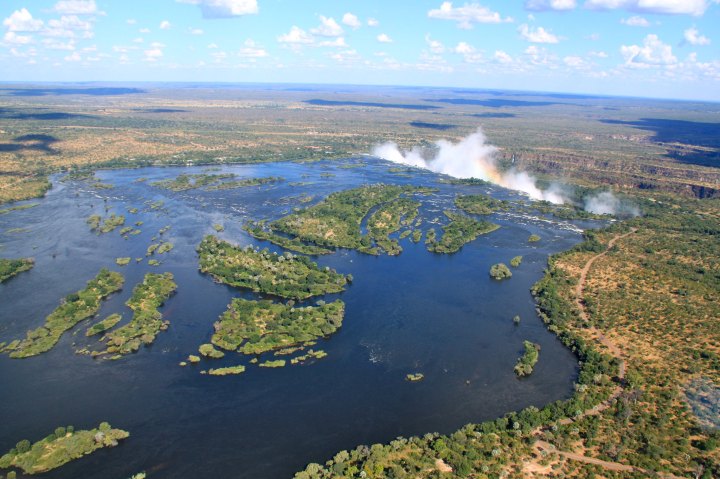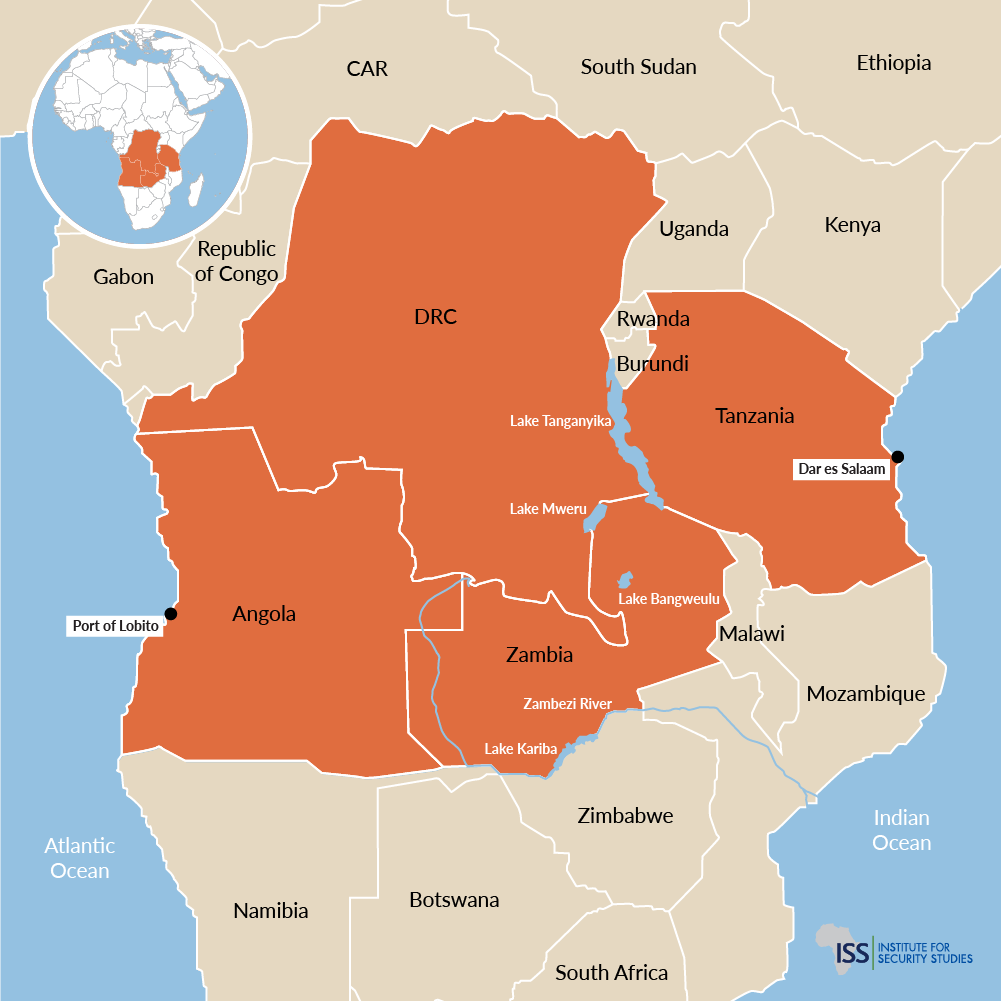ISS TODAY OP-ED
Blue economies could transform Zambia from landlocked to ‘land-linked’ nation

There is immense potential for Zambia’s maritime ambitions to bolster the country’s sustainable development.
The maritime industry is commonly associated with coastal states, but the maritime domain includes inland waterways such as lakes, rivers and dams. That means landlocked countries such as Zambia can actively advance their interests in the sector.
They can do so by using international cooperation and legal frameworks like the United Nations Convention on the Law of the Sea (UNclos). Several landlocked states helped draft the convention, which established the current maritime governance system. UNclos balances exclusive economic zones with navigation rights for all states — not just those at the sea. Switzerland and Austria, for example, are landlocked countries that are creating thriving maritime industries by becoming ‘land-linked’.
African landlocked states have already shaped the maritime governance system. Ethiopia, in particular, often refers to itself as being confined in a ‘geographical prison’ — emphasising the need for coastal access and influencing maritime governance in the Horn of Africa and beyond.
The pull for access to ports is expected to rise for landlocked countries, particularly for trade and offshore resource exploitation. UNclos provisions offer these states coastal access rights, often through deals with coastal states, like the Ethiopia-Somaliland agreement granting Ethiopia access to the Berbera Port for commercial and military purposes.
Read more in Daily Maverick: World Oceans Day — blue economy may chart a route to stronger AU-EU ties
The global shift towards sustainable energy has intensified demand for critical raw materials crucial for clean energy technologies. An International Energy Agency report says the copper, cobalt and lithium demand is expected to surge by 40%, 70% and 90% respectively in the coming decades.
This presents a major opportunity for Zambia, given its endowment of copper deposits — and the planned Lobito Corridor could hold the key. The 1,300 km rail line will connect the Democratic Republic of the Congo (DRC) and Zambia to the Atlantic Ocean through Angola’s Lobito Port. In October 2023, the United States (US) and European Union signed an agreement on the corridor with the African Development Bank to support Angola and Africa’s two largest copper producers, the DRC and Zambia.

Zambia’s blue economy potential. (Graphic: Supplied by ISS Today)
The DRC and Zambia already export most of their copper to China. In February, Beijing announced a $1-billion investment to refurbish the Tanzania-Zambia railway connecting Zambia’s Copperbelt to the Indian Ocean through Dar es Salaam’s port.
Although the global race for access to critical raw materials can unlock Zambia’s development potential, it presents geopolitical complexities and potential risks. Some see renewed US interest in the Lobito Corridor as Washington’s response to Beijing’s Belt and Road Initiative — part of the broader US-China geopolitical rivalry.
Read more in Daily Maverick: Copper is king in the world of mining
The two global powers adopt divergent approaches. China is assertive, offering infrastructure projects and loans to secure access to resources, which has raised debt dependency concerns. China’s aim is to strengthen its grip on the regional mining industry, particularly in copper exports. This growing influence has significant economic, environmental and political implications.
The US often employs a strategy centred on economic partnerships and investments, aiming to foster development and mutual benefits with developing countries. But will Washington deliver on its pledges and overcome political risk concerns?
Read more in Daily Maverick: Biden’s push for revamp of Lobito Corridor may pinch toes of China’s Belt and Road Initiative
Zambia’s strategic central location — equidistant from the Atlantic and Indian oceans — means it can serve as a vital hub connecting various regional trade corridors. This allows for balanced engagement with the US and China, and a diplomatic approach that serves its economic and developmental goals. This resonates with President Hakainde Hichilema’s foreign policy of courting the West while maintaining relations with China.
The pressure of geopolitical competition requires Zambia to navigate carefully to safeguard its national interests. Priorities include transparency, infrastructure development, job creation and a meticulous assessment of agreement terms.
Role in blue economy governance
Zambia can also play an important role in international ocean governance, especially on climate change. The country joined the International Maritime Organization in 2015 — one of only six landlocked African countries out of 16. It also recently signed the United Nations Biodiversity Beyond National Jurisdiction Treaty. Now Zambia must help develop and implement sustainable shipping practices and ratify the treaty to protect the world’s oceans.
With vast water bodies such as the Zambezi River, lakes Tanganyika, Kariba, Bangweulu and Mweru — most of which are transboundary — Zambia has 40% of southern Africa’s freshwater resources, crucial for sustainable development.
However, the lack of a specific UNclos provision on inland waterways makes governing transboundary water bodies like lakes and rivers difficult. The 1996 UN Economic Commission for Europe Convention on the Protection and Use of Transboundary Watercourses and International Lakes is the sole globally binding legal framework for collaboration on shared water resources. Zambia hasn’t signed or acceded to this convention — and should so.
Zambia’s recent validation of a national blue economy strategy targeting biotechnology, environmental sustainability, ecosystem services, inland water transport, fishing industry management, and underwater mineral resources recognises the potential of these vast freshwater resources.
Economic growth must however be harmonised with environmental sustainability. To achieve that, the blue economy strategy should be housed under the Green Economy and Environment Ministry, in partnership with Trade and Industry. By creating a synergy between environmental conservation and economic development, Zambia can navigate climate-related challenges and foster a sustainable and inclusive approach to its maritime sector.
Zambia’s strategic location and ratification of the African Continental Free Trade Area position it as a future trade hub in SADC and the Common Market for Eastern and Southern Africa. Through maritime connectivity, larger volumes could be shipped at more economical rates compared to road and air alternatives, with the lowest environmental impact per tonne in the transport sector.
As Zambia explores its potential maritime industry, it must look beyond extractives — where the US and China are the big winners — and consider how intracontinental trade could unlock opportunities for sustainable development. DM
David Willima, Research Officer, Maritime, Institute for Security Studies (ISS) Pretoria.
First published by ISS Today.


















 Become an Insider
Become an Insider
Zambia is already a key conduit for goods traded into both Copperbelts (Zambia and DRC), as well as some intra-regional trade into Tanzania, Malawi, and up into the Great Lakes. If the rail projects currently under consideration of planning go ahead, there is a very good opportunity for the port at Mpulungu to become a key gateway for goods from South Africa to central East Africa – up Lake Tanganyika all the way to Uganda, eastern DRC and potentially South Sudan. It’s one of the key missing links in greater intra-regional trade. However, the projects the author mentions and a whole lot of others in Angola, Mozambique, Namibia and Tanzania are a major threat to SA as a supplier of pretty much anything beyond our immediate neighbours. Critical intervention needed, but we’re playing yap-dog statesman in conflicts around the world instead.